外研版英语七年级上册Module 10 Unit2 精品教案 (1)
外研版七年级英语上册教案Module 10 Unit 2

Module 10 Spring Festival Unit 2 My mother’s cleaning our house and sweeping away bad luck.本模块话题是“节日”。
要求学生掌握描述节日的表达方式,同时加强学生对中外节日的理解与认识。
通过使用现在进行时,对该话题展开听、说、读、写的语言实践活动。
使学生加深能够谈论或写出对该节日的介绍,并了解英语国家中重要的节假日及其主要庆祝方式。
有助于学生了解世界,提高学习效率,形成自主学习的能力,为学生的终身学习奠定基础。
教学中教师应随时随地以课本为出发点,灵活利用各种素材组织教学过程和内容。
【知识目标】1.能正确运用下列词汇:tradition, bad, luck, paint, mean, decorate, decoration, paper cut,everyone, haircut, New Year, New Year’s Eve, dumpling, sweet pudding, fireworks, few, a few,week, round, all the year round, bring, colour, something, cut, Christmas.2. 能读懂对正在发生的事情的描述;3. 能描述正在发生的事情。
【能力目标】1. 正在发生的事情的描述;2. 学会写明信片;3. 学会描述自己或他人正在做的事情;4. 学会用and 连接句子。
【情感目标】通过对其他国家或地方人们生活的了解,培养对异国文化、生活习俗的兴趣,提高对本国文化的认识。
【教学重点】能够通过阅读材料读懂描述春节的短文,并能与每一段落相对应的图片搭配,熟练运用现在进行时。
【教学难点】区分现在进行时与一般现在时的用法,用所学的知识描述英国的圣诞节。
Tape recorder, MultimediaStep 1. Warming-up1.Talk about what you know about the Spring Festival.2.Talk about the questions:What traditions do you know? (food and decorations)Do you know the paper cut?Do you often have a haircut?Step 2. Vocabulary1. Show some pictures, ask the students to look at the pictures, then talk something about thepictures.3. Introduce the new words and expression and transform verb phrases into the gerunds.4. Read the new words and expressions.5. Look at the pictures and talk about what’s happening.Step 3. Listening and reading1.Listen to the text and answer the questions below.1. When does the Spring Festival usually come?2. What should mother do before Spring Festival?3. How are the people celebrating on the Spring Festival evening?2. Complete the passage with the correct words and expression from the box.celebrate dumplings few luck meanprogramme sweep away traditionalStep 4. Language points1.with prep. 和,带有,用2. It’s a few days before Spring Festival.a few一些,表示肯定的概念,修饰可数名词复数。
外研版七年级英语上册:Module 10 Unit 2-教案

Module 10 Spring FestivalUnit 2 My mother’s cleaning our houses and sweeping away bad luckTeaching analysis Teachingaims1. To match photos with paragraphs and match questions withparagraphs2. To get information from the reading material about theSpring Festival3. To make notes and write sentences4. To learn to write paragraphsTeachingimportantand difficultpoints1.Key vocabulary:Christmas, February, January, before, sweep away, luck, mean, table, celebrate, traditional, dumpling, programmer, sweater, coat,lucky, tree, tell2. Key phrase:good luck, bad luck, decorate … with…, have a haircut, on New Year’s Day, a kind of at midnight, a few, at Lantern Festival,all the year round, on Spring Festival’s Eve, sweep away3. Key structures:1) My mother’s cleaning our house and sweeping away badluck.2) We are celebrating Spring Festival with a traditional familydinner on the evening before Spring Festival.3) I am eating jiaozi—a kind of dumpling.4) My parents and I are visiting my uncles and aunts.5) We are wearing new sweaters and coats.Teaching type Reading and writing.Teachingmeasure Interactive approachTeaching tools Recorder, OHP, videoTeaching proceduresChapter 1 Lead-in : Warming upStep 1 Warming-up1. Review the text of Unit 1.2. Show some pictures, ask the students to look at the pictures, then talk something about the pictures.3. Introduce the new words.4. Read the new words.Chapter 2 The students can learn by themselves, and ask some questions about the study.Step 2 Work in pairs.1. Read through the example sentences in Activity 1.—What’s Li Shan’s mother doing?—She’s cleaning the house.2. Look at the pictures and talk about what’s happening.Step 3 Group work1. Listen to the passage and answer the questions.1) Who is cleaning the house?2) Who gives Li Shan a Hongbao?Keys: Li Shan’s mother is cleaning the house.Li S han’s uncles and aunts.2. Read the passage and match the paragraphs with the pictures in Activity 1.3. Check with a partner.4. Call back the answers from the whole class.Keys: 1 2 3Chapter 3 The students can learn the main point with the help of the teacher, and solve the problems.Step 4 Reading.1. Play the recording.2. Ask the students to read through the passage.Read the passage and complete the sentences.1) People usually _____ houses and sweep away ___________ before Spring Festival.2) After the traditional family dinner, people usually watch a ________ on TV.3) In China, hongbao means _______ money.Keys: 1. clean; bad; luck 2. special programme 3. lucky3. Complete the passage with the correct words and expression from the box in Activity 3.celebrate dumpling few luck mean programme sweep away traditionalWe (1) ________ Spring Festival in January or February. A (2) ___ days before Spring Festival we clean our homes and (3) ___________ all the bad (4) ____.In the evening before Spring Festival we have a big family dinner. We eat lots of (5) _________ food, such as jiaozi –a kind of (6) _________. We usually watch a special (7) __________ on television, and parents usually give their children a hongbao. It (8) ______ lucky money.4. Check with a partner.5. Call back the answers from the whole class.Keys:1celebrate 2.few 3.sweep away 4.luck 5traditional6dumplings 7.programme 8. MeansRead the passage together.Step 5 Writing and speaking.1. Look at the notes about Christmas in Britain.The notes about Christmas in Britain.a) go shopping for presentsb) have a traditional family dinnerKeys:sweep it away sweep away the paper/ sweep the paper away2. We are celebrating Spring Festival with a traditional family dinner on the evening before Spring Festival.celebrate作动词,意为“庆祝”。
新外研版七年级英语上册Module 10 Unit 2 教案

Module 10 Unit 2 教案课题:Module10 Spring Festival Unit2 课型:阅读课一、教学背景分析(一)教材内容分析:本课是七年级上册Module10,Unit2,话题是春节。
这是学生特别熟悉和喜爱的话题之一,他们对春节的基本习俗都有一定的了解,但是一些习俗的英文表达是难点,如贴春联、放鞭炮等。
本单元课文是从一个学生的视角,通过三张照片介绍了中国人过春节的一些基本习俗和活动。
文中运用了现在进行时介绍照片上当时的情景,也用一般现在时介绍了春节的习俗和活动。
但由于现在进行时不太好操作,且介绍习俗用一般现在时也很适合,因此,本节课定位于运用一般现在时进行介绍。
此外,课文中对春节典型的习俗活动的介绍不够充分,对新的庆祝方式涉及少,因此通过讨论和补充阅读,补充和拓展更多的相关信息。
(二)学情分析:1、学生进入初一学习后已三个月,初步掌握了基本的阅读技能,能够阅读相应水平的文章,并能从中获取具体信息,概括文段大意。
2、学生对中国的传统节日——春节有一定的了解,知道一些春节的习俗和庆祝活动,但词汇量有限,难以用英文准确表达出来。
二、教学目标:通过本课的学习,学生能够:1、使用有关春节习俗的词汇进行交流表达。
2、通过图片和阅读快速获取文章段落的大意。
3、运用春节的话题词汇和一般现在时态介绍春节的习俗和活动。
4、深入了解和体验春节的习俗,热爱并传播我们的传统文化。
三、重点和难点(一)重点:1、阅读策略的指导,文章架构的理解。
2、运用一般现在时和所学相关词汇,向他人介绍春节期间人们的习俗和活动。
(二)难点:1、春节习俗和活动的相关词汇。
2、正确运用所学词汇,向他人介绍春节的习俗和活动。
五、板书设计。
2019年外研版初中英语七年级上册Module 10 Unit 2 My mother’s cleaning our houses 优质课教案

Book1 Module10 Spring Festival一、教学内容:Unit2 My mother’s cleaning our house and sweeping awaybad luck.二、课型:Reading and writing三、教学目标:1、能够正确使用下列单词和词组:Christmas, February, January,before, sweep away, luck, table, celebrate, traditional, dumpling, programme, sweater, coat, mean, lucky, merry, tell.2、能够通过阅读材料读懂描述春节的短文,并能与每一段落相对应的图片搭配。
3、继续学习现在进行时,并能区分现在进行时与一般现在时的用法。
4、用所学的知识描述英国的圣诞节。
四、教学重难点:1、能够通过阅读材料读懂描述春节的短文,并能与每一段落相对应的图片搭配,熟练运用现在进行时(重点)2、区分现在进行时与一般现在时的用法, 用所学的知识描述英国的圣诞节。
(难点)五、教学准备:课堂整体运用任务型教学模式以及阅读课“四个阶段”教学模式。
本课指导学生通过阅读获取信息,培养学生阅读技能。
在教学过程中,采用多媒体手段辅助教学,利用各种图片和习题任务贯穿整个教学过程。
因此,本节课需准备:PPT课件、挂图、录音机、课堂练习表格、奖品六、教学过程:“What’s Li Shan’passagein China. We do many3.Reading in groupsdifficulties.words and expression达标训练题一. 单项选择.1.She is _______ in her room at the moment.A. looking her bookB. seeing the bookC. reading the bookD. watching the book2.Look! The boy is __________ in the river now.A. swimingB. swimmingC. swimD. swims3.–Is she drawing pictures now?--________________.A. Yes, she is.B. Yes, he is.C. No, she isD. Yes,she isn’t.4. My sister _________ eating an apple.A. doesn’tB. doesC. areD. isn’t5. My father often __________ to work.A. walkB. rides a bikeC. by bikeD. is walking二. 句型转换.1. He is taking some photos now. (改为一般疑问句)________ he taking _________ photos now?2. We are looking at the old watch. (改为否定句)We ______ ________ looking at the old watch.3.Li Lei is cleaning the house now. (对划线部分提问)_________ is Li Lei ________ now?4.They are doing their homework in the classroom. (对划线部分提问)________ ________ they doing their homework?5.She usually washes her clothes on Sundays.(用now改写句子) She _______ __________ her clothes now.。
外研版-英语-七上Module10 2单元 精品教案

Unit2 精品教案ⅠTeaching modelReading and writing.ⅡTeaching methodInteractive approachⅢTeaching aims1. To match photos with paragraphs and match questions with paragraphs2. To get information from the reading material about the Spring Festival3. To make notes and write sentences4. To learn to write paragraphsⅣTeaching Objectives1. Key vocabulary: Christmas, February, January, before, sweep away, luck, mean, table, celebrate, traditional, dumpling, programme, sweater, coat, lucky, tree, tell2. Key phrase:good luck, bad luck, decorate … with…, have a haircut, on New Year’s Day, a kind of at midnight, a few, at Lantern Festival, all the year round, on Spring Festival’s Eve, sweep away2. Key structures:1) My mother’s cleaning our house and swee ping away bad luck.2) We are celebrating Spring Festival with a traditional family dinner on the evening before Spring Festival.3) I am eating jiaozi—a kind of dumpling.4) My parents and I are visiting my uncles and aunts.5) We are wearing new sweaters and coats.ⅤTeaching aidsRecorder, OHP, videoⅥTeaching StepsStep 1 Warming-up1. Review the text of Unit 1.2. Show some pictures, ask the students to look at the pictures, then talk something about the pictures.3. Introduce the new words.4. Read the new words.Step 2 Work in pairs.1. Read through the example sentences in Activity 1.—What’s Li Shan’s mother doing?—She’s cleaning the house.2. Look at the pictures and talk about what’s happening.Step 3 Read the passage and match the paragraphs with the pictures in Activity1.1. Read the passage and match the paragraphs with the pictures in Activity1.2. Check with a partner.3. Call back the answers from the whole class.Step 4 Reading.1. Play the recording.2. Ask the students to read through the passage.3. Complete the passage with the correct words and expression from the box in Activity 3.4. Check with a partner.5. Call back the answers from the whole class.Keys:1. celebrate2. few3. sweep away4. luck5. traditional6. dumplings7. programme 8. means6. Read the passage together.7. Learning to learnStep 5 Writing and speaking.1. Look at the notes about Christmas in Britain.2. Match the notes with the headings.3. Call back the answers from the whole class.Keys: Getting ready: a, ePresents: c, dTraditional things on Christmas Day: b, c, d, f, g, h4. Read the phrases together.Step 6 Writing1.Write sentences with the notes in Activity 4.Join two notes and write one sentences with and.2. Choose one of the headings in Activity 4 and write about Christmas in Britain. Step 7 Do exercises:单词拼写1. We are _________ (打扫) the wall together.2. It ____________ (意味着) happening.3. There are lots of ____________ (饺子) on the plate.4. _____________ (每个人) has his own problems.Keys: 1. sweeping 2. means 3. dumplings 4. Everyone完成句子。
外研版-英语-七上外研版英语七上Module10:2单元教案

2011-2012外研版英语七上Module 10:Unit 2教案M10 U2 How often do you use a computer?教材分析The main topic of this unit is computer. Students can learn about how people in different places of the world use computer。
语言目标1.About knowledge: to understand questions and answers.2. About ability: to improve listening, speaking, reading and writing skills.3. About attitude: to be active to study and be confident.知识与能力1.Grammar: special questions and answers; affirmative and negative forms in Present Simple.2. Phrases: buy tickets, check train timetable, download music, get information, go online, maketravel plans, send email, use Internet, visit website3. Through reading, listening, speaking and writing exercises, be able to ask and answer questions with the new phrases in this unit and write a report in Present Simple.情感目标Be active to take part in the activities. Cooperate in a group. Be confident.过程与方法1.Guide the Ss to find out the answers by themselves.2. Set up different activities to reach the teaching goals.课堂检测题:一. 根据中文写出英文单词。
外研版英语七年级上册Module 10 Unit2 精品教案 (1)

Unit2 精品教案Ⅰ.Teaching modelReading and writing.Ⅱ.Teaching methodInteractive approachⅢ.Teaching aims1. To match photos with paragraphs and match questions with paragraphs.2. To get information from the reading material about the Spring Festival.3. To make notes and write sentences.4. To learn to write paragraphs.Ⅳ.Teaching Objectives1. Key vocabulary: Christmas, February, January, before, sweep away, luck, mean, table, celebrate, traditional, dumpling, programme, sweater, coat, lucky, tree, tell2. Key structures:1) My mother’s cleaning our house and sweeping away bad luck.2) We are celebrating Spring Festival with a traditional family dinner on the evening before Spring Festival.3) I am eating jiaozi—a kind of dumpling.4) My parents and I are visiting my uncles and aunts.5) We are wearing new sweaters and coats.Ⅴ.Teaching aidsRecorder, OHP, videoⅥ.Teaching StepsStep 1 Warming-up1. Review the text of Unit 1.2. Show some pictures, ask the students to look at the pictures, and then talk something about the pictures.3. Introduce the new words.4. Read the new words.Step 2 Work in pairs.1. Read through the example sentences in Activity 1.—What’s Li Shan’s mother doing?—She’s cleaning the house.2. Look at the pictures and talk about what’s happening.Step 3 Read the passage and match the paragraphs with the pictures in Activity1.1. Read the passage and match the paragraphs with the pictures in Activity1.2. Check with a partner.3. Call back the answers from the whole class.Step 4 Reading.1. Play the recording.2. Ask the students to read through the passage.3. Complete the passage with the correct words and expression from the box in Activity 3.4. Check with a partner.5. Call back the answers from the whole class.6. Read the passage together.7. Learning to learnStep 5 Writing and speaking.1. Look at the notes about Christmas in Britain.2. Match the notes with the headings.3. Call back the answers from the whole class.Keys: Getting ready: a, ePresents: c, dTraditional things on Christmas Day: b, c, d, f, g, h4. Read the phrases together.Step 6 Writing1.Write sentences with the notes in Activity 4.Join two notes and write one sentences with and.2. Choose one of the headings in Activity 4 and write about Christmas in Britain. Step 7 Do exercises:。
外研版7上M10-U2教案
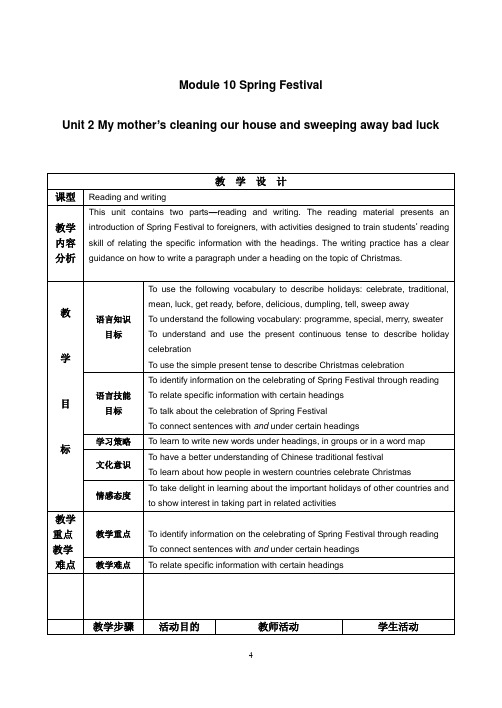
To identify information on the celebrating of Spring Festival through reading To connect sentences with and under certain headings
教学难点
To relate specific information with certain headings
1. Read Paragraph 1 and answer the question from the teacher. 2. Read the rest of the passage and match the paragraphs pictures. 3. Listen to the passage and answer the questions. 4. Read aloud the with the
with the words and expressions about Festival Spring and
Festival. 2 Talk about
describe Activity 1.
教
and leading-in
happening in the three pictures.
lead in the topic
教学步骤
活动目的
4
教师活动
学生活动
To the 1. Warming-up
familiarize students
1.
Get
the
students
to
1 Think of words and phrases about Spring what’s
brainstorm “Spring Festival” 2. Ask the the students pictures to in
外研版英语七年级上册Module 10 Unit2 精品课件 (1)

e) get lots of food ready f) sing Christmas songs g) say Merry Christmas to family and friends h) have a Christmas tree
Look at the notes about Christmas in
about what’s happening.
—What’s Li Shan’s mother doing?
—She’s cleaning the house.
Listen and read
Complete the passage with the correct words and expression from the box.
I am eating jiaozi—a kind of dumpling.
We are wearing new sweaters and coats.
I always get a hongbao, lucky money, from them.
Look at the pictures and talk
When you write new words, write
them under headings, in groups or ina word ma源自. Use pictures and
drawings.
Write sentences with the notes in Activity 4.
our homes and (3) ____________ sweep away all the bad (4) _____. luck In the evening before Spring Festival we have a big family dinner. We eat lots of (5) _________ traditional food, such as jiaozi – a kind of (6) __________. dumpling We usually watch a special (7) ___________ programme on television, and parents usually give their children a hongbao. It (8) ________ means lucky money.
Module10Unit2教案2022-2023学年外研版英语七年级上册

一、教学内容
Module 10 Unit 2《What can you play?》教案,2022-2023学年外研版英语七年级上册。本节课主要围绕音乐和乐器展开,教学内容包括:
1.学习并掌握本课的新词汇:piano、violin、guitar、drum、play the piano等;
3.培养学生的思维品质:在学习过程中,引导学生主动思考、分析和解决问题,提高学生的逻辑思维和批判性思维能力;
4.提升学生的学习能力:鼓励学生积极参与课堂活动,培养自主学习、合作学习和探究学习的能力,提高学生的学习效率。
三、教学难点与重点
1.教学重点
(1)词汇:新词汇的学习和应用,包括piano、violin、guitar、drum等乐器名称,以及play the piano等短语。
其次,在新课讲授环节,我注意到学生们在理解情态动词can的用法上还存在一些困难。在今后的教学中,我需要更加耐心地讲解和举例,让学生们在实际语境中反复练习,以提高他们对这一知识点的掌握。
此外,实践活动和小组讨论环节取得了很好的效果。学生们在分组讨论中积极发表自己的观点,这不仅提高了他们的口语表达能力,还培养了他们的团队协作能力。在今后的教学中,我会继续采用这种形式,让学生们在互动交流中提高英语应用能力。
举例:学生需要能够在不同的语境中正确使用这些词汇,如:“I can play the guitar.”、“Can you play the piano?”等。
(2)句型:情态动词can的用法,以及一般疑问句和回答的表达。
举例:学生应掌握如何构造和使用情态动词can来询问和回答能力问题,如:“Can you play the violin?”、“Yes, I can.”、“No, I can't.”。
外研版英语七年级上册教案:Module 10 Unit 2
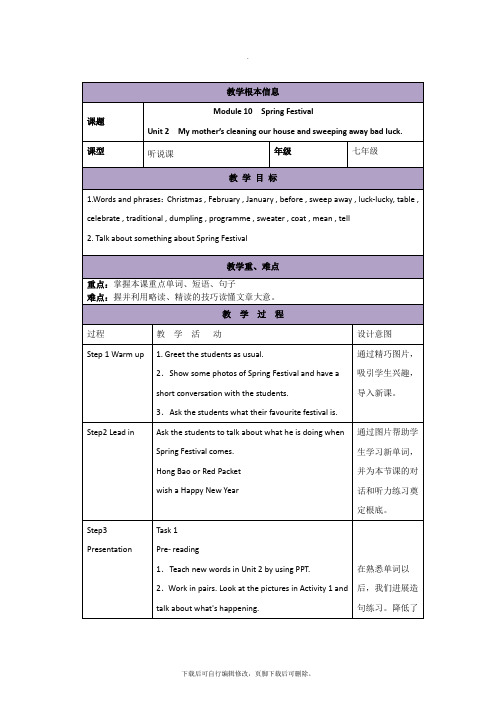
稳固练习本节课的目标语言,合理使用目标词汇及句型。
Step5 Sum up
What do you know today ?
本节课主要学习了重点单词:
What do you know today ?
本节课主要学习了重点单词:
2.他们用鲜花装饰房间。
They _________ the house ___________.
3.dumplings是什么意思?
_________ dumplings ______?
4.我们有好几天不清扫家居。
We _________ the house ____________.
5.元宵全年带给我们好运。
Task 2Whilereading
1.Ask the students to read the passage and get the main idea of each paragraph of the passage.
2.Match the paragraphs with the pictures in Activity 1.
Unit 2介绍了LiShan的家庭成员为迎接春节而进展的准备工作以及春节期间的活动,没有采用第三人称进展纪实性描述或报道,而是采用第一人称的口述方式,说话人通过展示多张关于春节的照片,来介绍我国的传统佳节——春节。本单元的语言构造主要是现在进展时,通过短文的学习,培养学生的阅读分析能力,同时也要求学生能够就有关春节的习俗进展简单的写作。
重点短语:
on the same day, have a look at, a few days before…,sweep away, a traditional family dinner, so much, after the dinner, lucky money
新外研版初中英语七年级上册Module 10 Unit 2 My mother is cleaning our house 优质课公开课教案
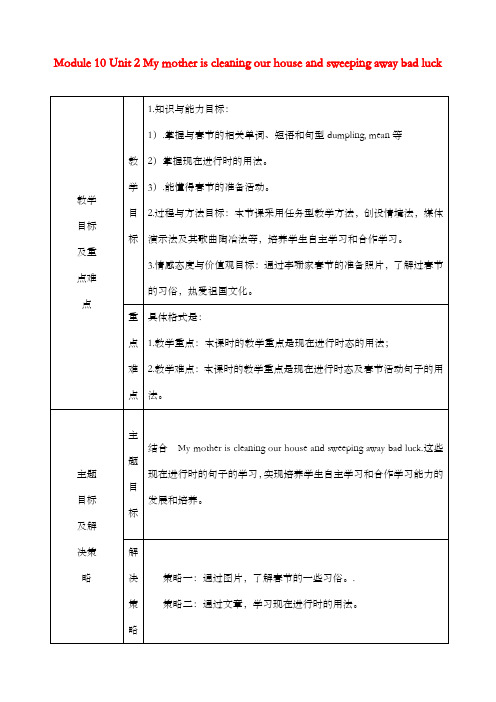
Module 10 Unit 2 My mother is cleaning our house and sweeping away bad luck教学目标及重点难点教学目标1.知识与能力目标:1).掌握与春节的相关单词、短语和句型dumpling, mean等2)掌握现在进行时的用法。
3).能懂得春节的准备活动。
2.过程与方法目标:本节课采用任务型教学方法,创设情境法,媒体演示法及其歌曲陶冶法等,培养学生自主学习和合作学习。
3.情感态度与价值观目标:通过李珊家春节的准备照片,了解过春节的习俗,热爱祖国文化。
重点难点具体格式是:1.教学重点:本课时的教学重点是现在进行时态的用法;2.教学难点:本课时的教学重点是现在进行时态及春节活动句子的用法。
主题目标及解决策略主题目标结合My mother is cleaning our house and sweeping away bad luck.这些现在进行时的句子的学习,实现培养学生自主学习和合作学习能力的发展和培养。
解决策略策略一:通过图片,了解春节的一些习俗。
.策略二:通过文章,学习现在进行时的用法。
教学环节集体备课个性化修改与反思板书设计Unit2 My mother is cleaning our house and sweeping away bad luck.It means good luck.它意味着好运。
表达“……是什么意思?”的三种句型:What does … mean?What do you mean by …?What’s the meaning of …?e.g. “apple”是什么意思?What does apple mean?What do you mean by apple?What’s the meaning of apple?一、定向预习明确目标预学主题一:结合生词表掌握Unit2生词问题引领:看课本P96页,第十模块后18个单词,借助录音磁带和单词音标掌握单词读音,借助工具书掌握单词用法。
外研版英语七年级上册Module 10 Unit2 精品教案 (1)
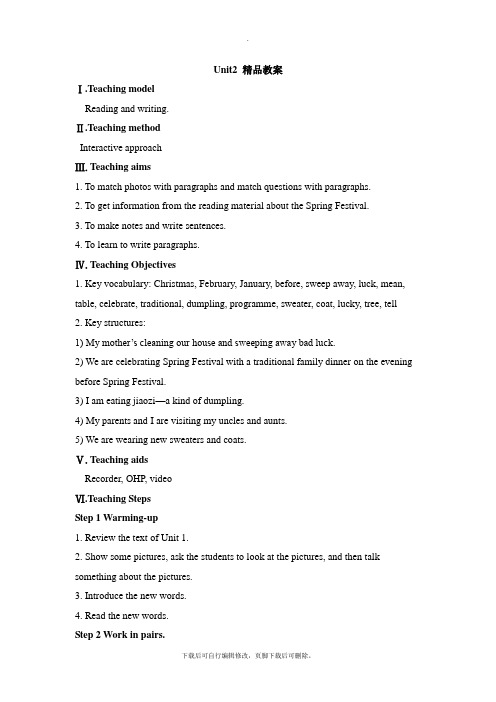
Unit2 精品教案Ⅰ.Teaching modelReading and writing.Ⅱ.Teaching methodInteractive approachⅢ.Teaching aims1. To match photos with paragraphs and match questions with paragraphs.2. To get information from the reading material about the Spring Festival.3. To make notes and write sentences.4. To learn to write paragraphs.Ⅳ.Teaching Objectives1. Key vocabulary: Christmas, February, January, before, sweep away, luck, mean, table, celebrate, traditional, dumpling, programme, sweater, coat, lucky, tree, tell2. Key structures:1) My mother’s cleaning our house and sweeping away bad luck.2) We are celebrating Spring Festival with a traditional family dinner on the evening before Spring Festival.3) I am eating jiaozi—a kind of dumpling.4) My parents and I are visiting my uncles and aunts.5) We are wearing new sweaters and coats.Ⅴ.Teaching aidsRecorder, OHP, videoⅥ.Teaching StepsStep 1 Warming-up1. Review the text of Unit 1.2. Show some pictures, ask the students to look at the pictures, and then talk something about the pictures.3. Introduce the new words.4. Read the new words.Step 2 Work in pairs.1. Read through the example sentences in Activity 1.—What’s Li Shan’s mother doing?—She’s cleaning the house.2. Look at the pictures and talk about what’s happening.Step 3 Read the passage and match the paragraphs with the pictures in Activity1.1. Read the passage and match the paragraphs with the pictures in Activity1.2. Check with a partner.3. Call back the answers from the whole class.Step 4 Reading.1. Play the recording.2. Ask the students to read through the passage.3. Complete the passage with the correct words and expression from the box in Activity 3.4. Check with a partner.5. Call back the answers from the whole class.6. Read the passage together.7. Learning to learnStep 5 Writing and speaking.1. Look at the notes about Christmas in Britain.2. Match the notes with the headings.3. Call back the answers from the whole class.Keys: Getting ready: a, ePresents: c, dTraditional things on Christmas Day: b, c, d, f, g, h4. Read the phrases together.Step 6 Writing1.Write sentences with the notes in Activity 4.Join two notes and write one sentences with and.2. Choose one of the headings in Activity 4 and write about Christmas in Britain. Step 7 Do exercises:单词拼写1. We are _________ (清扫) the wall together.2. It ____________ (意味着) happening.3. There are lots of ____________ (饺子) on the plate.4. _____________ (每个人) has his own problems.Keys: 1. sweeping 2. means 3. dumplings 4. Everyone完成句子。
七年级英语上册Module10lUnit2Mymother第1课时教案外研版

Unit 2 My mother's cleaning our house and sweeping away bad luck.Ⅰ.Teaching modelReading and writingⅡ.Teaching aims1.To understand the key words and expressions about the topic2.To get information from the reading material about Spring Festival3.To make notes and write sentences4.To learn to write paragraphsⅢ.Teaching aidsTape recorder,handoutⅣ.Teaching Steps第一课时(Activity 1-Activity 2)Step 1:Warming up and lead-in1.Show some pictures,ask the students to look at the pictures,and then talk something about the pictures to review the text in Unit 1.2.Ask students to discuss the questions:(1)What do you often do before Spring Festival?(2)What do you often do on the eve of the new year?(3)What do you often do during Spring Festical?3.Introduce and teach the new words and phrases.go shoppingbuy a lot of fooddecorate the doors and windows with paper cutsput up(挂) the red lanternsput up Chinese coupletsbuy new clothesget a hongbao called lucky moneywatch a dragon dancevisit family and friendsclean the househave a haircutset off the fireworkswatch a special programme on TVhave a big dinner togethereat jiaozi4.Read the new words and phrases.Step 2:Work in pairs1.Read through the example sentences in Activity 1.—What's Li Shan's mother doing?—She's cleaning the house.2.Look at the pictures and talk about what's happening.Step 3:Reading1.Play the recording and listen to the tape carefully.2.Play the tape.Let students listen and repeat,and answer the questions.1)Who is cleaning the house?2)Who gives Li Shan a hongbao?Keys:Li Shan's mother is cleaning the house.Li shan's uncles and aunts.3.Ask students to read the passage,work in pairs and find out the difficulties in the passage,and offer help.4.Explain the difficulties to the students.5.Read the passage and match the paragraphs with the pictures in Activity 1.6.Check with a partner.7.Call back the answers from the whole class and check the answer.Keys:A ①B②C③8.Ask students to read the passage aloud.Step 4:Homework1.Learn the new words by heart.2.Read the passage in groups.3.Finish off the workbook exercises.Blackboard DesignUnit 2My mother's cleaning our house and sweeping awaybad luck.(Activity 1-Activity 2)good luck,bad luck,decorate…with…,have a haircut,on New Year's Day,a kind of,at midnight,a few,at Lantern Festival,all the year round,on Spring Festival's Eve,sweep away1.My mother's cleaning our house and sweeping away bad luck.2.We are celebrating Spring Festival with a traditional family dinner on the evening before Spring Festival.3.I am eating jiaozi—a kind of dumpling.4.My parents and I are visiting my uncles and aunts.5.We are wearing new sweaters and coats.。
2021-2022学年 外研(新标准)版七年级上册英语Module10Unit2教案设计
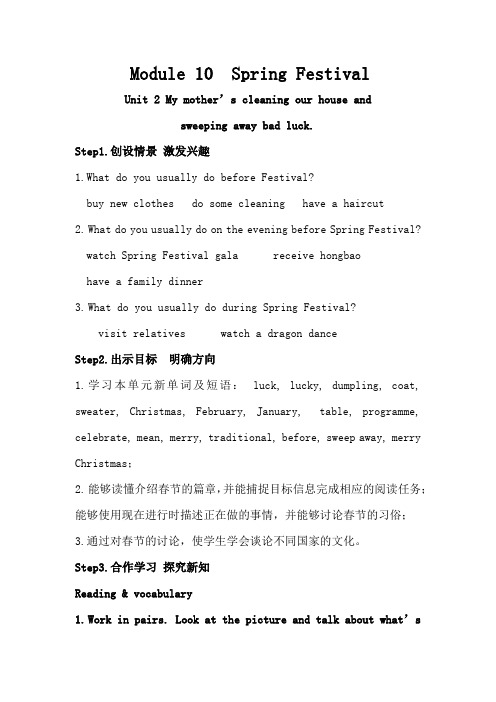
Module 10 Spring FestivalUnit 2 My mother’s cleaning our house andsweeping away bad luck.Step1.创设情景激发兴趣1.What do you usually do before Festival?buy new clothes do some cleaning have a haircut2.What do you usually do on the evening before Spring Festival? watch Spring Festival gala receive hongbaohave a family dinner3.What do you usually do during Spring Festival?visit relatives watch a dragon danceStep2.出示目标明确方向1.学习本单元新单词及短语:luck, lucky, dumpling, coat, sweater, Christmas, February, January, table, programme, celebrate, mean, merry, traditional, before, sweep away, merry Christmas;2.能够读懂介绍春节的篇章,并能捕捉目标信息完成相应的阅读任务;能够使用现在进行时描述正在做的事情,并能够讨论春节的习俗;3.通过对春节的讨论,使学生学会谈论不同国家的文化。
Step3.合作学习探究新知Reading & vocabulary1.Work in pairs. Look at th e picture and talk about what’shappening.—What’s Li Shan’s mother doing?—She’s cleaning the house.一读:Fast reading (快读)2.Read the passage and match the paragraphs with the pictures in Activity 1.二读:Careful reading (细读)Part 1. Read paragraph 1 and answer the following questions. 1)What’s similar(相似的)between Spring Festival and Christmas?They happens every year, but not on the same day.2) When is Spring Festival?It usually comes in February, but sometimes it comes in January.Part 2. Read paragraph 2 to 4 and finish the table.Read the phrases in the passage and put them into Chinese.1. on the same day2. in January/February3. have a look at4. a few5. sweep away6. bad luck7. so much 8. a kind of9. watch a special programme 10. lucky money1.在同一天2.在一月/二月3.看一看4.一些5.扫去6.霉运7.如此多的 8.一种 9.观看一个特别节目 10.plete the passage with the correct form of the words and expressions.We (1)________ Spring Festival in January or February. A (2) _____ days before Spring Festival, we clean our homes and(3) __________all the bad (4)______. In the evening before Spring Festival we have a big family dinner. We eat lots of (5)_________ food, such as jiaozi – a kind of __________. We usually watch a special ____________ on television, and parents usually give their children a hongbao. It _____ lucky money.Step4.巩固新知检测达标Ⅰ.根据句意及汉语提示写出单词。
英语:Module 10《Computers》Unit 2 教案(1)(外研版七年级上)
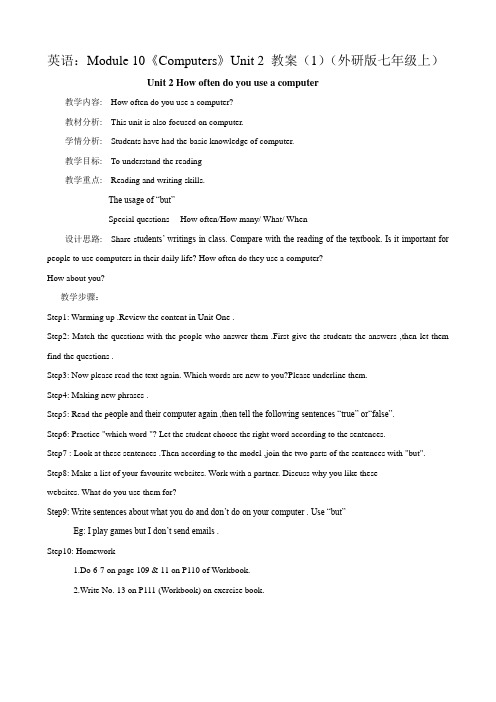
英语:Module 10《Computers》Unit 2 教案(1)(外研版七年级上)Unit 2 How often do you use a computer教学内容: How often do you use a computer?教材分析: This unit is also focused on computer.学情分析: Students have had the basic knowledge of computer.教学目标: To understand the reading教学重点: Reading and writing skills.The usage of “but”Special questions--- How often/How many/ What/ When设计思路: Share s tudents’ writings in class. Compare with the reading of the textbook. Is it important for people to use computers in their daily life? How often do they use a computer?How about you?教学步骤:Step1: Warming up .Review the content in Unit One .Step2: Match the questions with the people who answer them .First give the students the answers ,then let them find the questions .Step3: Now please read the text again. Which words are new to you?Please underline them.Step4: Making new phrases .Step5: Read the p eople and their computer again ,then tell the following sentences “true” or“false”.Step6: Practice "which word "? Let the student choose the right word according to the sentences.Step7 : Look at these sentences .Then according to the model ,join the two parts of the sentences with "but".Step8: Make a list of your favourite websites. Work with a partner. Discuss why you like thesewebsites. What do you use them for?Step9: Write sentences about what you do and don’t do on your computer . Use “but”Eg: I play games but I don’t send emails .Step10: Homework1.Do 6-7 on page 109 & 11 on P110 of Workbook.2.Write No. 13 on P111 (Workbook) on exercise book.。
- 1、下载文档前请自行甄别文档内容的完整性,平台不提供额外的编辑、内容补充、找答案等附加服务。
- 2、"仅部分预览"的文档,不可在线预览部分如存在完整性等问题,可反馈申请退款(可完整预览的文档不适用该条件!)。
- 3、如文档侵犯您的权益,请联系客服反馈,我们会尽快为您处理(人工客服工作时间:9:00-18:30)。
Unit2 精品教案
Ⅰ.Teaching model
Reading and writing.
Ⅱ.Teaching method
Interactive approach
Ⅲ.Teaching aims
1. To match photos with paragraphs and match questions with paragraphs.
2. To get information from the reading material about the Spring Festival.
3. To make notes and write sentences.
4. To learn to write paragraphs.
Ⅳ.Teaching Objectives
1. Key vocabulary: Christmas, February, January, before, sweep away, luck, mean, table, celebrate, traditional, dumpling, programme, sweater, coat, lucky, tree, tell
2. Key structures:
1) My mother’s cleaning our house and sweeping away bad luck.
2) We are celebrating Spring Festival with a traditional family dinner on the evening before Spring Festival.
3) I am eating jiaozi—a kind of dumpling.
4) My parents and I are visiting my uncles and aunts.
5) We are wearing new sweaters and coats.
Ⅴ.Teaching aids
Recorder, OHP, video
Ⅵ.Teaching Steps
Step 1 Warming-up
1. Review the text of Unit 1.
2. Show some pictures, ask the students to look at the pictures, and then talk something about the pictures.
3. Introduce the new words.
4. Read the new words.
Step 2 Work in pairs.
1. Read through the example sentences in Activity 1.
—What’s Li Shan’s mother doing?
—She’s cleaning the house.
2. Look at the pictures and talk about what’s happening.
Step 3 Read the passage and match the paragraphs with the pictures in Activity1.
1. Read the passage and match the paragraphs with the pictures in Activity1.
2. Check with a partner.
3. Call back the answers from the whole class.
Step 4 Reading.
1. Play the recording.
2. Ask the students to read through the passage.
3. Complete the passage with the correct words and expression from the box in Activity 3.
4. Check with a partner.
5. Call back the answers from the whole class.
6. Read the passage together.
7. Learning to learn
Step 5 Writing and speaking.
1. Look at the notes about Christmas in Britain.
2. Match the notes with the headings.
3. Call back the answers from the whole class.
Keys: Getting ready: a, e
Presents: c, d
Traditional things on Christmas Day: b, c, d, f, g, h
4. Read the phrases together.
Step 6 Writing
1.Write sentences with the notes in Activity 4.Join two notes and write one sentences with and.
2. Choose one of the headings in Activity 4 and write about Christmas in Britain. Step 7 Do exercises:。
